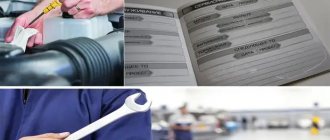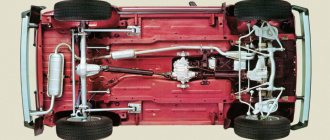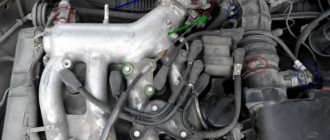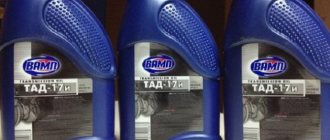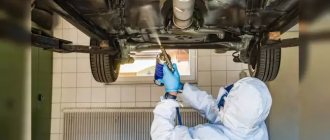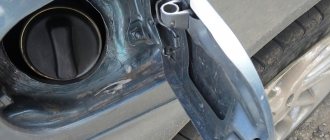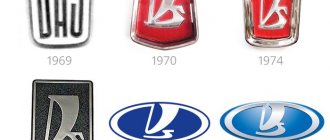Farewell to the official
Increasingly, car enthusiasts are switching to third-party services for maintenance. In addition to the extortions, they are not satisfied with the prices. For example, the first maintenance (carried out after a mileage of 15 thousand km) for a Hyundai Solaris car from an official dealer will cost 9.3 thousand rubles. A similar set of works in a car service center not authorized by the distributor, but specializing in the repair of Korean cars, will cost 4.8 thousand rubles. This is a serious argument, and dealers threaten to void the car's warranty if they refuse their services. However, these claims are unfounded.
— From the point of view of the law, the requirements of official dealers to undergo maintenance only at their place are unfair. There is no such thing as a waiver of warranty. There is non-compliance with the terms of the contract, which still needs to be proven. According to Article 16 of the Law “On the Protection of Consumer Rights,” it is prohibited to link the purchase of certain goods and services with the mandatory purchase of other goods and services. This means that the dealer does not have the right to blackmail by removing the warranty. According to the law, the consumer is free to choose a car service center,” says Anton Nedzvetsky, head of the Russian Automotive Consumer Society.
Photo: © RIA Novosti/Alexey Filippov
According to the lawyer, Article 18 of the Law “On the Protection of Consumer Rights” states that the manufacturer or seller is responsible for defects in the product unless it is proven that they arose as a result of violation of the rules of use or the actions of third parties. This is the only reason on which a dealer can refuse warranty repairs.
For example, according to the regulations, a person changed the oil himself at a third-party service center, and after a while the engine broke down. The dealer does not have the right to refuse to replace the engine or repair it unless he proves that the malfunction is due to low-quality oil or poor work of the craftsmen who changed it. The motorist also has the right to turn to an independent expert. This is even more true for cases when, for example, the steering fails, which was not touched in a third-party service.
zastavka
Does the warranty cover the entire vehicle, or are there exceptions?
The Law “On the Protection of Consumer Rights” states that during the warranty period, all manufacturing defects must be eliminated free of charge. It doesn’t matter how many times the car’s owners change: as long as the warranty period has not expired, the manufacturer’s obligations remain. Please note that the warranty does not usually cover parts subject to heavy wear and tear. That is, if upon purchase you notice that the windshield wiper blades (brake pads, etc.) are defective, you, of course, must replace them, but you should not make such a claim after a year of operation (even if the general warranty is five years) : they will refuse you, and quite legally. As a rule, warranty periods are shortened for engine components, suspension, exhaust systems, etc. You can (and should!) familiarize yourself with the full list of parts and assemblies covered by a shortened warranty before purchasing a car. But the warranty on the body (in the absence of mechanical damage) is often longer than on the car as a whole. Upon purchase, you will receive a service book, which sets out the obligations of the manufacturer and owner, as well as all exceptions to the warranty. The topic of whether it is possible to return a new purchased car is discussed in the article at the link.
Changing the oil in a “gray” service – loss of warranty
Official dealers are people too and really want to eat. So much so that the price for regular maintenance forces customers to use third-party services. Carrying out planned work “outside” is one of the most critical moments in the relationship between the client and the dealer. The officials are categorically not happy with the fact that the planned work is not being carried out at their place, because they are losing money. Then what forces motorists, who are easily serviced in “gray” centers and receive quality services for an adequate amount, to come to the officials? Of course, breakdowns occur during the warranty period. This is where the fun begins: without seeing the mark in the service book about the passage of official maintenance, the car owner may be denied warranty repairs. But there is a nuance here - the refusal is legal only with the appropriate expert conclusion that the malfunction occurred precisely through the fault of the third-party service. In simple terms, this means the following: “left” servicemen who only changed the oil and air filter could hardly have caused knocking on the suspension or failure of one of the sensors or. But this must be established by an examination.
“The car owner, of course, has every right to carry out scheduled maintenance at any car service center. The main condition is that all work must be carried out based on the manufacturer’s recommendations. If a malfunction or defect appears in the car, then warranty repairs can be refused only in one case, if this same malfunction is associated with poorly performed work in a third-party car service center. In my practice, there was a case when the owner of the car himself carried out maintenance. After some time the engine failed. The dealer initially refused a warranty replacement, but after receiving a claim (a copy of which, by the way, was sent to the manufacturer), he conducted a study that confirmed the presence of a manufacturing defect. As a result, the engine was replaced under warranty,” says lawyer and auto expert Sergei Smirnov.
When do dealers try to void the warranty?
Never! The fact is that the very term “remove the guarantee” or “fly off the guarantee” does not exist at all in the PSA. There is a term “warranty period”. And, since this is a deadline, you cannot miss the deadline, and you cannot remove the car from it.
An official dealer can only refuse warranty repairs (within the warranty period) if he proves that the defect (breakage, defect, complete loss of the car) was caused by the consumer. And it is the car dealership that must prove this.
What is consumer guilt? Installing additional equipment or carrying out maintenance at a location other than a dealer does not mean that any breakdown in the car subsequently occurred automatically precisely because the work was not carried out at a dealer, although this is exactly what most dealers claim.
Most often, refusals of warranty repairs occur due to the following actions of the buyer, performed outside the walls of the dealership:
- You have installed an alarm system (when the dealer can immediately claim that you will lose your electrical warranty or completely void the warranty),
- You carried out the maintenance yourself (for example, you changed the oil yourself, and then the dealer says that you no longer have a warranty on the engine),
- installed parking sensors,
- sometimes they even used tire fitting services,
- carried out wheel alignment,
- carried out body repairs after an accident,
- changed suspension parts (here you can also “fly away” from the warranty only supposedly on the suspension),
- and an even greater variety of work - the main thing is that it was carried out outside the dealership.
All of the above statements by the dealer are not based on the law. Most often, the plot of refusal of warranty repair occurs according to the following scenario:
- the driver does something (carries out certain work on the car) not at the dealer, which, according to the dealer’s terms, leads to the car or part of it falling out of warranty,
- then a breakdown may occur in the car (which may not be at all related to additional equipment or work),
- the buyer comes to the dealership where he bought the car and complains,
- The car dealership technicians discover the installation of additional equipment,
- The salon technicians directly say: “You didn’t install [insert the required item] here, that’s where you go, that’s why your car broke down!”
As we can see, the dealer, without any examination, simply pointed out the fault of the third-party car service center. It is illegal. As we said above, there is no concept of “failure of warranty” in the law. Consequently, the seller’s obligations to eliminate defects in the goods do not disappear. Even if you installed additional. equipment or the maintenance was not carried out at the dealer, and even if this was the cause of the breakdown, that is, the defect occurred through your fault. This does not change the warranty period; the dealer simply loses the obligation to eliminate this particular defect in the product. And this responsibility passes to the causer of harm - the one who installed the equipment.
You cannot install non-standard acoustics and alarm systems.
Another pressing problem. Some official services may refuse warranty repairs if the car is equipped with an alarm system, a more advanced sound system, or other non-standard equipment. The dealer may not like this turn, because the work was not carried out at his place. However, officials cannot simply refuse without an expert opinion that it was this or that non-standard equipment that led to the burnout of the electrical equipment. By the way, some service stations openly talk about the absence of problems in accessing “gray” services. Here, for example, is a quote from the website of an Ekaterinburg dealer of the Kia brand: “It is possible, but if it is a certified center. If the installed equipment negatively affects the operation of the car, you will have to prove for a long time that this was not the fault of your alarm or radio. Therefore, it is better to go to official dealers, they have all the necessary equipment and knowledge.”
For what reasons do they refuse maintenance at the dealer?
More than 15% of car enthusiasts prefer to either lose the warranty or go into conflict with the dealer, but have their car serviced at normal prices in a car service center that is licensed by the manufacturer. Here are the main reasons for this choice:
Reason #1: Cost of routine maintenance.
Almost any work for which the official service charges huge bills can be done at a third-party station. Don't get hung up on the fact that it's not branded. Today there are many car services that specialize in cars of a specific brand and have the appropriate licenses. They have all the necessary equipment, knowledge and skills to complete any task, including engine overhaul and “brain rewiring”. And this at a lower cost, when costs do not take the last bit out of your pocket.
Reason No. 2: the cost of spare parts and additional equipment.
Official services use only original consumables and spare parts during repairs. As for ordinary car services, they don’t care in this regard: they can use any spare parts that meet quality requirements, so the choice is up to the client. Naturally, non-original products are cheaper than original ones. But in each individual case it is worth consulting with professionals, since quite often there are fakes whose quality is frankly poor.
Reason #3: queues for service.
There are almost always queues at branded service stations, and quite long ones at that. As for private stations, things are simpler there. If the owner notices a strong increase in the flow of clients, then he hires additional craftsmen, or simply extends the working day, raising workers’ wages. As a result, everyone is happy.
Reason No. 4: feeling of falsehood.
Most “officials” have a master who accepts orders for car repairs - a respectable manager, dressed in a good suit, who smiles all the time. Naturally, it is very pleasant to communicate with such a person, but people come to the service station not for conversations, but for repairs. Things are much simpler with ordinary stations, where it is possible to talk directly with those people who will be involved in repairs. Such conversations are much more constructive.
Reason #5: approach to repairs.
Branded stations have one feature - they never do small and painstaking work. If something doesn't work, they replace the entire assembly, not just one part. For example, if the automatic transmission breaks down, no one will tinker with it and figure out what the cause of the malfunction is. The craftsmen will simply install a new box, for which the owner will have to pay a tidy sum. But the problem may be some small thing that can be fixed much cheaper.
Reason No. 6: impossibility of being present during maintenance.
At any official service station you will be offered special rooms with installed screens, where customers can sit comfortably and watch how the masters work on their cars. Access to the premises where repairs are being carried out is closed. And this is bad if it becomes impossible to personally control the process. Ordinary craftsmen have nothing against the client observing their work, as long as he does not get under his feet.
Reason No. 7: the skill level of the mechanics.
Most good private car services employ real professionals in their field. Managers of private stations are well aware that the popularity of the service and, as a consequence, its profitability depend on the qualifications of their employees. That is why they spare no expense in hiring the best specialists. And they, as a rule, first hone their skills at branded service stations, and only then go to private owners, where they are offered better working conditions.
Reason No. 8: location of the official car service center.
Many official service stations are located in remote areas of cities. It makes no sense for them to gravitate towards the center, where the cost of renting premises is higher. In any case, they will have a constant flow of customers, since anyone who wants to maintain the guarantee will simply have to spend many hours getting to the desired service. In most cities, you can easily find several service stations or car services at once, which are located closer and charge several times less for their services.
Commentary with an eye to the Law
The law on the protection of consumer rights regarding the warranty period, including for a car, clearly states that all shortcomings that arose during the operation of the car are eliminated by the manufacturer or an authorized dealer at his expense.
If the driver, when operating the car, complies with all technical rules and regulations that the car manufacturer regulates in its Manual, he has no right to refuse a warranty for the car. The only exceptions are those cases in which it is established that a component or assembly of the machine has failed due to poor quality intervention. That is, simply put, if the gearbox is jammed, and before that a mechanic from the “Around the Corner” service climbed into it, then warranty service will definitely be denied.
Most manufacturers indicate in their operating manuals that the vehicle’s warranty remains subject to maintenance at an authorized dealer’s service center. This condition does not comply with the PPA.
Website editors
Publications on the topics: how to get a car loan, which car to choose for credit, conditions for car loans in banks for new and used cars, how to repay a car loan ahead of schedule, CASCO and MTPL insurance for a loan car. The editors of the “Car on Credit” website help you understand the issues of obtaining, repaying and servicing a car loan
Was this publication useful to you?
Bookmark it on social networks!
Total score: 6Votes: 9
Support for the auto industry - auto loans increase car sales growth
How to choose a used off-road car on credit - which model to take
We recommend other useful posts on this topic:
New car on credit: details and subtleties of registration
What to take out a car loan or a consumer loan - which is better and more profitable to apply for
Preferential conditions for the state lending program with state support
How to repay a car loan without damaging the family budget
How to get a loan for a truck or commercial vehicle
Car at a discounted price on credit: reality or fiction
It is prohibited to indulge in technical tuning components
Some may feel that modifications to a vehicle during the warranty period are not allowed. How are things really going? For example, can a tuning car with a lowered suspension, a rear wing and a huge intercooler sticking out in the bumper, and even a chip, show up for free warranty repairs? Another point is non-standard rims.
“When installing additional equipment, you must proceed from the following. The warranty covers the elimination of manufacturing defects. Therefore, if you installed an alarm system, installed wheels of the wrong size and because of this a defect appeared on the car, then you will not receive warranty repairs. This applies to any changes,” the expert clarifies.
How to prove that you are right?
Everything is quite simple. If the dealership refuses to take the car for warranty repairs for this reason, then you should immediately talk about the illegality of the refusal. To do this, you will have to talk with senior management, who definitely knows the legal norms and should resolve the issue in favor of the car owner.
If in this case a refusal is received, then you should contact the courts. This practice shows that if a competent examination is carried out in the event of a breakdown during the warranty period, it can be easily proven that even service not provided by official car repair shops is not the cause of problems with the car. The court takes the side of the motorists and either awards compensation for the damage caused, or returns the money for the vehicle, taking into account its rise in price.
Thus, every car owner should know what rights he is entitled to, and that his car may not be held “hostage” by an official dealer. Vehicle maintenance can be carried out anywhere. The main thing is that it can be trusted and experienced specialists work there.
Refueling with supposedly “bodily” fuel is the end
Another scenario of unpleasant communication with officials. After the fuel in the tank turns out to be of poor quality, as the service considers, and the car has a breakdown of the fuel system equipment or, God forbid, the engine, you are very likely to hear a refusal from the official dealer for repairs. Here everything is more complicated, but not to say that it is hopeless. So, fuel samples should be taken as soon as possible and examined for quality. If it turns out that gasoline or diesel fuel complies with the standards, but there were no violations of operating rules and the breakdown did not occur for this reason, then the center will have to repair the car at its own expense. But in reality everything is more complicated.
Is it possible to undergo maintenance at an official dealer?
Fortunately for all motorists, already in the summer of 2020, according to the Federal Law of July 1, 2011 N 170-FZ (as amended and supplemented) , maintenance completed at an official dealer can be considered a routine inspection.
If the dealer makes the required passing mark, then technical inspection operators automatically consider the inspection passed.
If the car is not registered on the territory of the Russian Federation, then the bill eliminates the need to undergo maintenance. The bill was successfully implemented and will actively gain momentum in August of this year.
The head of the Transport Committee, Evgeny Moskvichev, confirmed that technical inspection at a dealer is considered mandatory if the dealer is accredited in this area. In his opinion, this will greatly simplify the task for conscientious drivers.
To pass accreditation, the dealer will have to do the following procedures, which are:
- purchase specialized equipment;
- get your MOT certificate;
- go through enormous amounts of time associated with paperwork, etc.
As a result of the accreditation received, the dealer will be able to issue a diagnostic card, which is compiled simultaneously in several copies: written and electronic.
Interesting fact. The electronic form of such a card is sent to a unified system, where it is stored for at least five years from the date of receipt! If a written form is lost, the driver can obtain a copy from an electronic resource, but for a fee.
The abolition of the six-month coupon, which was necessary to purchase an MTPL insurance policy, was also approved.
Such changes were announced in a release by RIA Novosti. It is expected that this bill will greatly simplify obtaining a mark on diagnostic cards, and the driver will appreciate this step from a civic standpoint, because motorists will no longer have to pay for a second MOT, and also waste time on it.
